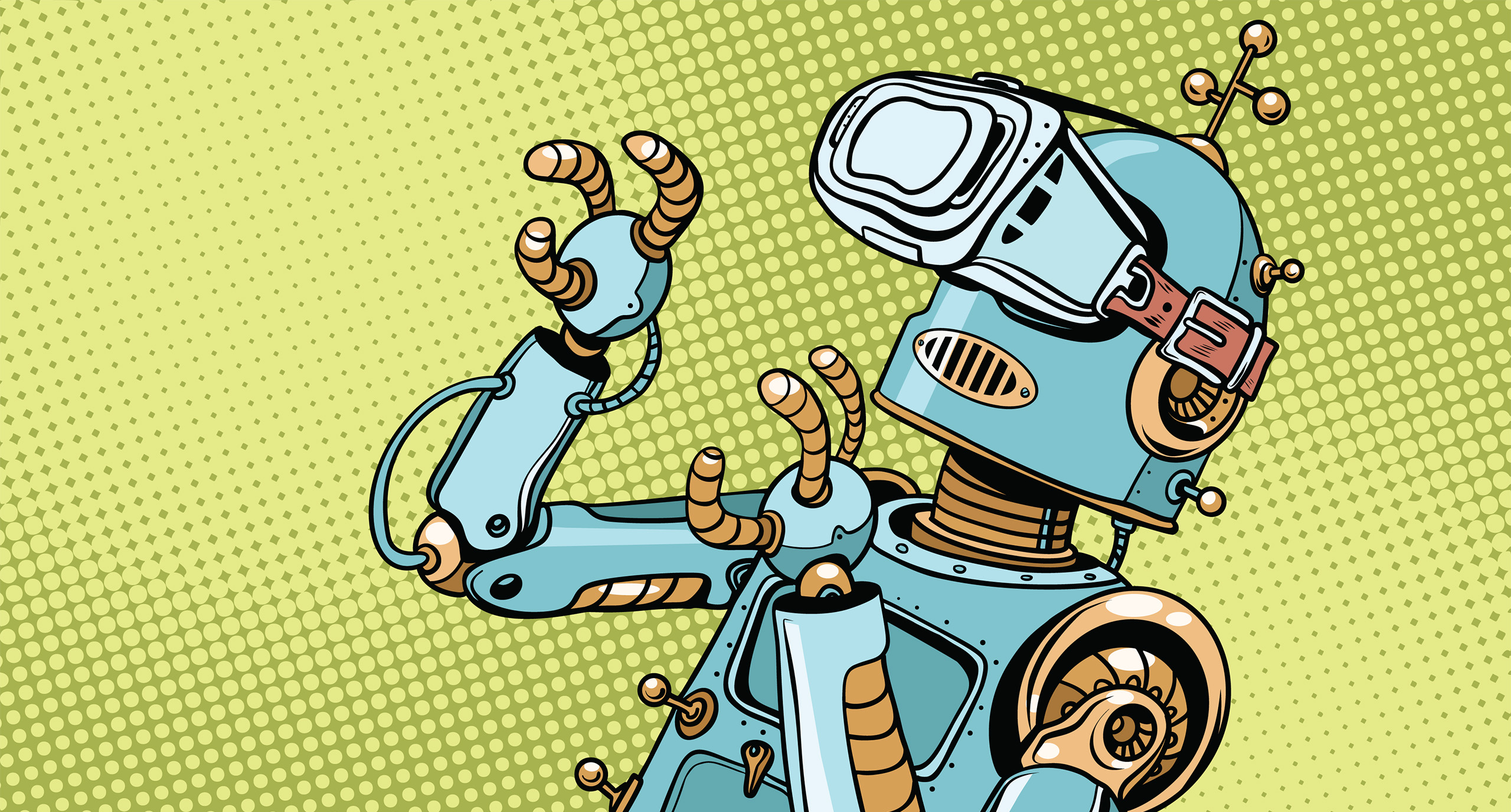
Does the Lawnmower Man Dream of Something More?
Going into this podcast, I’ll admit that my view on immersive technology took on a cynical bent. My generation was one of the last to experience what it was like to live in this world prior to the advent of the internet. A time when unknown knowledge either remained unknown—and perpetually pondered—or the answer was found out by perusing the local library or the out-of-date set of encyclopedias that lay dusty on our grandparents’ shelves. To “google” something took time; the search for knowledge was seldom instantly gratifying.
My parents had to convince me to get a cell phone when I went off to college because I had no interest in having one. (I mean landlines were never going anywhere, right?) It took me all the way past grad school to get my first smartphone. And now I’m just as glued to the screen as anyone else is. Fighting against technology in this world is a losing battle, because technology demands our attention and engagement. It saturates every corner of our lives. Through the interviews that Matt Ruff and I have done for this podcast, I still remain fairly cynical about the aims of this technology, but I now see the potential for a really poignant silver lining within it all.
Alongside the creation of this podcast and these conversations that we had, I had been reading various books that, unwittingly, spoke to elements of these very concerns. One book in particular written in 1973 by lesser known economist E.F. Schumacher, spoke of the concept of “technology with a human face.” He states in his book Small is Beautiful: Economics as if People Mattered,
“Strange to say, technology, although of course the product of man, tends to develop by its own laws and principles, and these are very different from those of human nature or of living nature in general. Nature always, so to speak, knows where and when to stop. Greater even than the mystery of natural growth is the mystery of the natural cessation of growth… As a result, the system of nature, of which man is a part, tends to be self-balancing, self-adjusting, self-cleansing. Not so with technology, or perhaps should I say: not so with man dominated by technology and specialisation. Technology recognizes no self-limiting principle…”
Schumacher goes on to make a case for a revolution in technological development, a revolution towards a development that is “self-balancing, self-adjusting, self-cleansing,” in other words, a technology that grows—or ceases growth—in alignment with the actual needs of humanity. He envisions a world where technology has its intended place of removing the burden of elements of work off the back of humanity so that work and leisure could become less compartmentalized. We begin to enjoy the work of our hands and perhaps work if enjoyed in such a way could actually become a type of leisure.
This seems utopian to our modern minds and he addresses that very charge. However, it is the underlying element of his argument that haunts me as I reflect back on this wonderful experience that Matt and I have ventured on. In the final podcast episode, Amir Ebrahimnia and Simón Rojas of Derooted spoke of developing technology for the sake of technology being a negative aspect of their work. Perhaps the cynical side of me continues to dominate my perspective, but I don’t think it would be a different argument to say that a good portion of technology is being pushed forward for the sake of the new. When I am drawn towards a new version of my smartphone, I recognize in moments of self-awareness that the attraction is founded in some ambiguous sense of newness, and the ability to say that I have the best version. Yet my use of the phone never changes. I could have the original version and it would work fine for what I mostly use it for.
This all seems tangential to immersive technology, I know, and this is because I have little experience with virtual reality or augmented reality and really little motivation towards experiencing it. It is not a natural inclination within me. So I am locating my argument in spaces where I have been colonized by the technology that surrounds me. Where I have become saturated by the “need” of said technology. My interest in immersive technology was always—and largely still remains—in the world of philosophical abstraction; what the technology means for how we experience our realities, our lives and relationships, and even our very own bodies. Perhaps this is why I felt most at home in the conversations we had with Michael Madary, Mariana Acunã Acosta, and Noah Nelson, where the discussions could veer into the potential consequences, good or bad, of technological development on humanity. Noah Nelson convinced me of a potential “human face” for immersive technology, and it doesn’t hurt that I am writing this within a global pandemic that requires connection via technology for the protection of our neighbors.
Yet something about this whole question of immersive technological development still gnaws at me. Are we searching for new worlds and new experiences to explore because our current world has lost its enchantment? We have succumbed to our privacy fences, our residential developments, our strip malls and concrete business centers, and communication matrices. We have colonized the natural world and made it in our image. No wonder the enchantment of the world and people outside our very doors is dead. Perhaps it might be said that this loss of enchantment was at the hand of technology—and its economic foundations? However, it’s never that simple, I know.
There are so many new horizons that are opened up for true, meaningful human connection, for joy and play—all legitimate human needs. Virtual reality allows people to see history from new angles, exemplified when we spoke to Brandon Oldenburg about War Remains (a VR experience that allows participants to explore the Western Front battlefield of World War I), and his insight into the ability of VR/AR developers to present conflict in other parts of the world that could make them palpable to us who are in relative safety in the first world. This technology has magnificent potential if its creators have service to humanity as their goal and not their profit margins. Unfortunately, threading that needle is extremely difficult in this day and age.
These conversations have given me hope. These people are out there, thinking about how humanity can be served by this new technology and, also, the unintended consequences. I also think about how fiction like Matt’s 88 Names can push through to the core of the questions that are ignored or taken for granted by creators, producers, and advertisers. Fiction has a way to clarify, strip away the faulty arguments, and reassess ethical consequences through narrative form. All of this while still celebrating the innovation of the human mind and the hard work of their hands. Perhaps a central flaw of John Chu, the protagonist in 88 Names, is his divided loyalties between profit and ethics. Our society wants to believe that he will choose doing right by his friends and employees, but often our actions betray our rhetoric. Fiction can expose those human frailties and inconsistencies.
Once we have arrived on the last page, a question still lingers: how shall we then live? Virtual reality has so much to offer the world as a burgeoning technology, but perhaps knowing how to slow or stop technological innovation in order to match true human needs is exactly the type of wisdom we need right now. We, as consumers, too, could learn how to put our desires for the new within constraints of how best to serve others, our communities, and our country. We may find ourselves desiring what is human instead. Perhaps finding a new type of enchantment in this world yet again.
About The Author

Blake Collier
Blake Collier is a columnist and editor at Reel World Theology and also contributes to Mockingbird, Film Inquiry, Rise Up Daily & Grindhouse Theology. You can find all of his articles, podcasts and publications at his website.